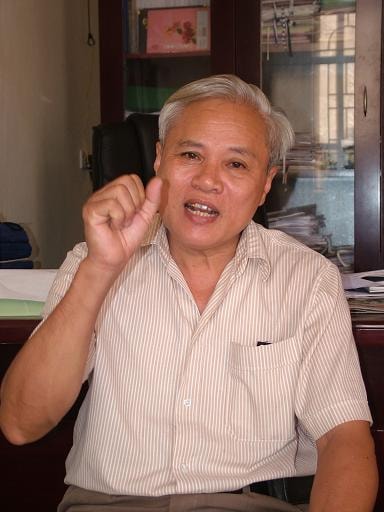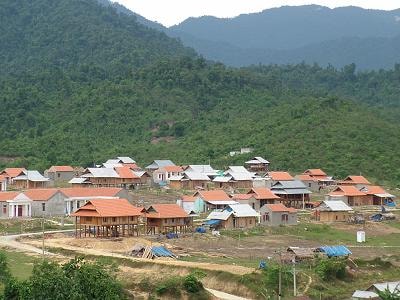"Lung Tich" of resettled people
The people of the Ban Ve Hydropower resettlement area all affectionately call him "lung Tich" (in Thai, it means Uncle Tich). Because he took care of the people and shared their sufferings in the early days of their arrival in the new land. He is Truong Cong Tich, currently holding the position of Chief of the Thanh Chuong District People's Committee Office, and in charge of ethnic affairs.
The word "prisoner" on Huoi Tu land
 |
Mr. Truong Cong Tich. |
He concluded a very basic thing in mass mobilization work in the Mong ethnic minority area, that in order to successfully mobilize the masses, one must directly contact and "break through" the thoughts of the women and wives in that family. Once, a Mong family in Huoi Kha village, because they wanted to test him, left silver in an easy-to-lose place before going to the fields. Seeing the silver, he immediately gathered it up and put it away, waiting for the homeowner to come home to explain the matter. When he learned about the matter, the homeowner's wife just smiled and said "xá lùa..." (so funny!). Later, he found out that they were testing him.
After 3 years working in Huoi Tu commune, living directly with the people in Huoi Kha, Huoi Le, and Huoi Dun villages..., everyone loved and trusted him, affectionately called him "tu tu" (Hmong for son), and considered him as a descendant in their family. Having excellently completed his tasks in Huoi Tu commune, he was transferred to Ky Son District Party Committee to hold the position of Deputy Head of the Organizing Committee. With another 5 years, he had the opportunity to travel to many areas and interact more with the people of various ethnic groups. Over 8 years working in Ky Son was filled with concern and sympathy for the poverty, backwardness, and extreme disadvantages of the people of various ethnic groups in this highland region...
...to "Lung Tich" in the resettlement area
The day he took office as Head of the Ethnic Affairs Department of Thanh Chuong District, many people did not know much about him, still thought he was not normal, that this, that... At the age of 53, if he did not get promoted, he would have to settle down and retire, but he took on the "bone" position, because managing the ethnic resettlement area was not simple at all. At first, he was a bit distracted, but thinking back, the Party Committee had assigned the task, the organization had also looked at the person, so he happily accepted the responsibility.
His first challenge was only after 9 days, 54 households in Kim Lien village, Kim Tien commune (February 6, 2006) were the first households to move to Thanh Chuong resettlement area when someone fell seriously ill. Being unfamiliar with the land and the place, the people did not know where to go for treatment so they contacted Dr. Tich. He thought: the people had just returned and were not familiar with him so they asked him, so he traveled to hire a car to take the sick person to the district general hospital. Then he himself contacted the doctor to treat the people. That time, the patient had heart failure but escaped death, the patient's family was very touched.
 |
Ban Ve Hydropower Resettlement Area. |
People in the resettlement area grew cassava in abundance and did very well. But only for one crop, the next crop was very cold and the cassava died en masse. He asked the cassava factory to support the seeds and purchase the products for the people. Two years ago, Dai Can mountain burned down because people burned it to make fields, causing a stir in the whole district. He knew that people did not understand and violated the law. So he mobilized his colleagues to coordinate with the forest rangers to propagate the law on forest protection, clearly explaining to the people that doing so was a violation of the law, thanks to which the protective forest was protected and people did not repeat the offense.
Everyone in the resettlement area knew about his love, sympathy and responsibility towards the people. There were days when he went to work in the area under the pretext of asking for sticky rice, when the people were having their meal, he saw only boiled bamboo shoots dipped in white salt on the tray and his heart ached. On the morning of the first day of the traditional New Year, he put on a warm coat and a raincoat and went through the forest to the resettlement area to celebrate the New Year with the people, much to everyone's surprise. The first day of the new year ended, he returned home with a warm heart after witnessing the people celebrating a happy, warm and safe New Year in the new land and was even happier when the people sent him hastily wrapped banh tet and some wild banana flowers still covered in white sap.
To help his colleagues in the room as well as everyone else easily communicate with the locals, he himself composed a "translator" song Thai-Kinh with nearly 30 sentences of common words in communication between Thai and Kinh: I am Noong, ai is Anh/ Noong Xao/ Younger sister, twenty years old/Hello Uncle/Healthy Lung/Yes/Khoi, healthy, that's a thank you... It was his closeness and wholehearted responsibility that partly helped the resettlement of the Ban Ve hydropower project to be on schedule, the migration of nearly 1,800 households with nearly 8,000 people was about to be completed. The resettled people still affectionately and affectionately called him "lung Tich" (Uncle Tich).
Huu Nghia






